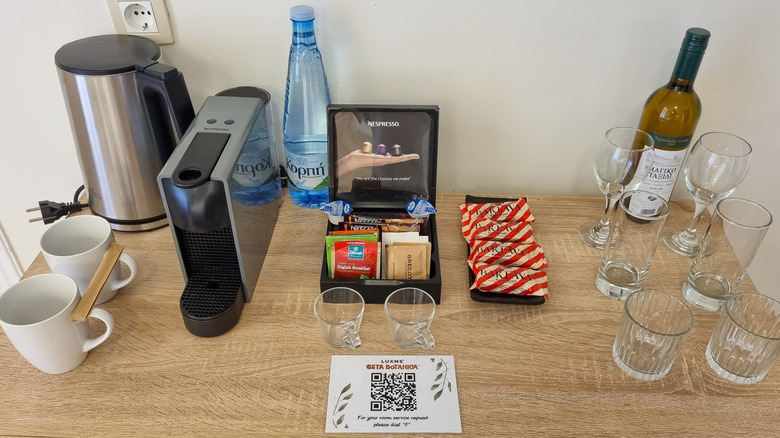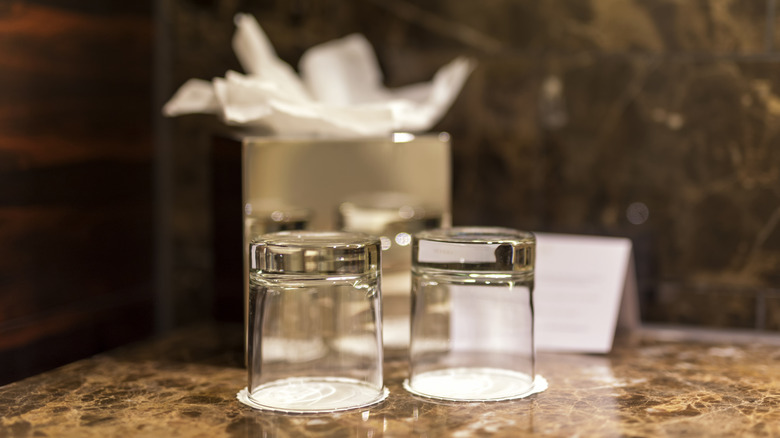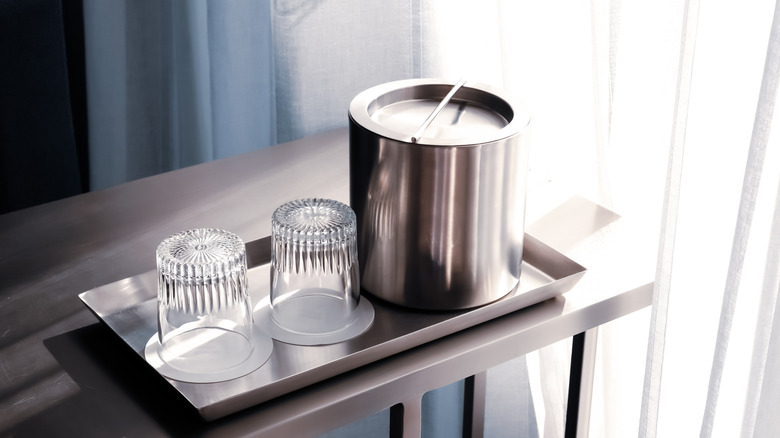One Unexpected Item In Your Hotel Room Is Likely Far Dirtier Than You Realize
We may receive a commission on purchases made from links.
Take a moment to picture a hotel corridor. It's midday in a posh establishment, so the housekeeping staff is busy at work cleaning and straightening guest rooms. You notice a couple of housekeeping carts parked outside open doors — carts stocked with clean sheets and towels, complimentary toiletries, the essentials the staff needs to efficiently turn over a room. Now look a bit closer. Do you see any glassware on the cart? Any used glasses en route to the kitchen for a run through the dishwasher or clean glasses to replace them in the guest room? Probably not. Here's why. Most hotels, even those of the 5-star variety, rarely clean guest room barware. Instead, things like glasses and ice buckets are usually just rinsed, wiped clean, and maybe sprayed with a disinfectant cleaning agent. Ewww, right? It's true.
In a 2022 article, Newsweek reported on a then-viral video making the rounds on social media. In the post, titled "5 Things I Would Never Do Working in a Hotel," a self-described hotel worker cautioned, "I'm not talking about the styrofoam glasses or the paper cups, I'm talking about glasses that are sitting there for your use. I would never use them without washing them first." Sour grapes from a stressed out employee? Not likely. Back in 2009, an ABC News Undercover Investigation revealed that some of the hotel drinking glasses tested during the investigation were dirty enough to pose a significant health risk. The study, conducted at 15 hotels across the country, incorporated a mix of hotel brands and categories including upscale properties. Test results from 11 of the 15 hotels revealed the in-room drinking glasses had not been removed from the room for cleaning, in some cases presenting a clear violation of both hotel policy and applicable state health codes.
Hazards hidden in plain sight
The ABC News Undercover Investigation also revealed hotel hazards including troubling shortcuts employed by housekeeping staff pressed for time. One of the most egregious concerns revealed in the report involved a housekeeper who was recording using an generic spray bottle labeled Lysol mildew remover to rinse dirty glasses. Investigators couldn't determine if the bottle actually contained the Lysol product which is considered harmful if swallowed. In another instance, housekeepers rinsed and dried dirty glasses with a cleaning rag before returning them to their place. But it's not just the glasses. We've all heard anecdotal stories about the sheer grossness a well-aimed ultra-violet will reveal on hotel guest room surfaces. Even the long-running television show "Monk" addressed the ick factor in a 2002 episode. Consider the in-room ice bucket. Turns out hotel guests routinely use the ubiquitous amenity for purposes other than toting ice.
In a 2024 article, Travel + Leisure asked Brian Labus, assistant professor in the Department of Epidemiology and Biostatistics at the University of Nevada Las Vegas, to name the most contaminated item in a hotel guest room. Without hesitation, Labus identified the common ice bucket. "The grossest thing is to use the ice bucket without a liner," Labus said. "We had a hotel norovirus outbreak some years ago where one of the modes of spread was through the ice buckets. People with diarrhea also were vomiting, so they grabbed the nearest thing: the ice bucket." An oversight? Not so much. Labus explained that even though bathrooms were sanitized between check-ins, the ice buckets were just rinsed. "The next guest got an unwanted surprise with the ice they put in their drinks."
The solution may come as a surprise
Icky? Yes. But hotel guests have been known to find even more creative ways to employ the ice bucket — like using it as a dirty diaper depository, or a doggie water bowl. Despite the persistent belief that a dog's mouth is cleaner than a human's, that's not the case. The truth is that — with the exception of the bacterium that causes periodontal disease in both dogs and humans — a dog's mouth is a better host for bacterial strains that aren't harmful to humans. We love our dogs, but that's a li'l bit off-putting.
"I got this," you may be thinking. "I'll bring disinfectant wipes. I can clean the drinking glasses and ice bucket when I check into my room." That may work for the glasses, but the ice bucket presents yet another risk — sourcing the ice. If you're staying in a place that offers room service, you can call for ice delivery. Since it originates in the hotel kitchen, you can pretty safely assume the ice — and ice bucket — are clean. But if you're in a place where down-the-hall ice machines are the only on-site source, you may be right back at square one.
That's because hotel ice machines are rarely emptied and cleaned. Even industry protocol calls for a professional cleaning only twice a year. In the meantime, as we have established, hotel guests have quirky habits, so it isn't much of a reach — pun intended — to assume at least a few guests over the course of six months stick their unsanitized hands right into the bin to grab a bunch of cubes, which leads us to an unexpected revelation: Despite our affinity for 5-star hotels, we may be better off staying in a lodging establishment that offers individually wrapped disposable cups and ice buckets. Something to think about.


